- Home
- Barry Eisler
Fault Line
Fault Line Read online
Also by Barry Eisler
RAIN FALL
HARD RAIN
RAIN STORM
KILLING RAIN
THE LAST ASSASSIN
a cognizant original v5 release november 04 2010
REQUIEM FOR AN ASSASSIN
Contents
Cover
Other Books By This Author
Title Page
Dedication
Chapter 1 - Looking Up
Chapter 2 - One Shot
Chapter 3 - A Simple Understanding
Chapter 4 - Waiting Room Doors
Chapter 5 - Oops
Chapter 6 - Implacable
Chapter 7 - So Long As They Fear Us
Chapter 8 - The Flavor of the Food
Chapter 9 - Sadly Eternal
Chapter 10 - King of the World
Chapter 11 - Haunted House
Chapter 12 - Emergency
Chapter 13 - DÉJÀ Fucking Vu
Chapter 14 - No Nonsense
Chapter 15 - For the Sake of Argument
Chapter 16 - Karmic Kilter
Chapter 17 - Exactly What I Tell You
Chapter 18 - Better Luck Next Time
Chapter 19 - Ritual
Chapter 20 - In Another Thousand: Years
Chapter 21 - Insubstantial
Chapter 22 - Infinite Loop
Chapter 23 - Outthought
Chapter 24 - Virus
Chapter 25 - A Kind of Madness
Chapter 26 - Like A Dream
Chapter 27 - We’re Done
Chapter 28 - Stand Down
Chapter 29 - Sting
Chapter 30 - You Always Have
Chapter 31 - Squeezed
Chapter 32 - Head-On
Chapter 33 - Just A Negotiation
Chapter 34 - Dead Man’s Switch
Chapter 35 - A Break in the Routine
Acknowledgments
Author’s Note
Excerpt from Inside Out
About the Author
Copyright
For Naomi, Dan, and Maya, with love
1 LOOKING UP
The last thing Richard Hilzoy thought before the bullet entered his brain was, Things are really looking up.
He was on his way to the Silicon Valley offices of his lawyer, Alex Treven, who had arranged a meeting with Kleiner Perkins, the Midases of venture capital who could increase a company’s value a hundredfold just by offering to invest. And now Kleiner was considering writing a check to him, Richard Hilzoy, genius, inventor of Obsidian, the world’s most advanced encryption algorithm, destined to render all other network security software obsolete. Alex had already applied for the patent, and if things worked out with the VCs, Hilzoy would be able to rent office space, buy equipment, hire staff—everything he needed to finish commercializing the product and bring it online. In a few years he would take the company public, and his shares would be worth a fortune. Or he’d stay private, and become to security software what Dolby was to sound, raking in billions in licensing revenues. Or Google would buy him—they were into everything these days. The main thing was, he was going to be rich.
And he deserved it. Working for chump change in an Oracle research laboratory, drinking Red Bull after Red Bull late at night and shivering in the deserted company parking lot for tobacco breaks, enduring the taunts and laughter he knew went on behind his back. Last year his wife had divorced him, and boy was the bitch ever going to be sorry now. If she’d had any brains she’d have waited until he was rolling in money and then tried to shake him down. But she’d never believed in him, and neither had anyone else. Except Alex.
He walked down the cracked exterior steps of his San Jose apartment building, squinting against the brilliant morning sun. He could hear the roar of rush hour traffic on Interstate 280 half a block away—the whoosh, whoosh of individual cars, trucks grinding gears as they pulled on from the entrance ramp at South Tenth Street, the occasional angry honk—and for once, having to live like this, right on top of the freeway, didn’t bother him. Even the cheap bicycles and rusting barbecues and stained plastic garbage containers crammed together against the side of the adjacent building didn’t bother him, nor did the reek the autumn breeze carried from the overflowing parking lot Dumpster.
Because Alex was going to get him out of this sewer hole. Oracle was a client of Alex’s firm, and Hilzoy was Alex’s contact on patents there. Hilzoy hadn’t been overly impressed initially. He’d taken one look at Alex’s blond hair and green eyes and figured him for just another pretty boy—rich parents, the right schools, the usual. But he’d recognized soon enough that Alex knew his shit. Turned out he wasn’t just a lawyer, but had degrees from Stanford, too—undergraduate in electrical engineering, same as Hilzoy, and a Ph.D. in computer science. He knew at least as much programming as Hilzoy, maybe more. So when Hilzoy had finally worked up the nerve to pull him aside and ask about patenting Obsidian, Alex had gotten it right away. Not only had he deferred his fees, he’d introduced Hilzoy to a group of angel investors who had put in enough money for Hilzoy to quit his day job and buy the equipment he needed. And now he was poised to take money from the biggest swinging dicks of all. All in the space of a single year. Unbelievable.
Of course, there were aspects of Obsidian that the VCs might not like if they knew about them. They might even have found them scary. But they wouldn’t know, because there was no reason to tell them. Obsidian could protect networks, and there wasn’t a Fortune 500 company out there that wouldn’t pay out the wazoo for that. That’s what VCs understood. The rest … well, that would all just be his little secret, a kind of insurance policy to fall back on if Obsidian’s intended uses weren’t enough to command the proper sums.
He looked at his watch. He was nervous about the meeting. But there was time enough for a cigarette; that would calm him down. He stopped at the bottom of the stairs and fired one up. He took a deep drag, then put the pack and the lighter back in his pocket. There was a white van parked next to his car, an ’88 Buick Regency he’d bought after selling his Audi during the divorce. humane pest control, the van said. He’d noticed it here, what, three times in the last week? Four? He’d seen a rat once, under the Dumpster. And there were roaches. Somebody must have made a stink with building management, and now the idiots were trying to show they were doing something about it. Whatever. Pretty soon that would all be someone else’s problem.
There were some scares along the way, existing inventions Alex was concerned might prevent them from getting a patent. And something about a possible secrecy order from the government, which could slow things down. But so far Alex had always found a way around the problems. The patent hadn’t been issued yet, but the application itself was bankable.
Hilzoy had been worried at first about describing the source code in the patent application because anyone who got hold of it would know the recipe for Obsidian, but Alex had assured him the Patent and Trademark Office maintained all applications in strict confidence for eighteen months, at which point they’d have a good idea about whether a patent would be forthcoming. And once the patent was issued, it wouldn’t matter whether people knew the recipe or not—they couldn’t use it without paying him the big bucks. And if they tried to, Alex would sue them into the ground. That’s right, people, you want to play, you got to pay.
He paused in front of the Buick and got out his keys. What a piece of crap. It had over a hundred thousand miles on it and every one of them showed. It was the kind of car you could piss all over and no one would even notice. A Mercedes, he thought, not for the first time. Or maybe a BMW. Black, a convertible. He’d have it detailed four times a year so it would always look new.
The pest control guy got out of the van. He was wearing a baseball cap, coveralls, and
gloves. He nodded to Hilzoy through a pair of shades and moved past him. Hilzoy nodded back, glad he didn’t have to kill rats for a living.
He took a drag on the cigarette, then tossed it away, enjoying the feeling of wasting it. He blew the smoke up at the sky and unlocked the car door. Yeah, baby, he thought. Oh yeah. Things are really looking up.
2 ONE SHOT
Alex Treven was pacing in his office at the law firm of Sullivan, Greenwald, Priest & Savage. Outside the window was an expanse of hard blue sky and the gentle curves of the Palo Alto hills below it, but Alex was oblivious to the view. It took him five steps to reach one sun-dappled wall, where he would stop, pivot, and repeat the process in the other direction. He counted steps, imagining he was wearing down a path in the green carpet, trying to distract himself with trivia.
Alex was pissed. Hilzoy, who ordinarily was even more punctual than Alex, had picked today of all days to be late. They were going to see Tim Nicholson—Tim frigging Nicholson!—and the Kleiner partner wasn’t going to be impressed if Hilzoy couldn’t make a first meeting on time. And it wasn’t going to make Alex look good, either.
He checked his watch. Well, they still had thirty minutes. Hilzoy was supposed to get here an hour early for a last rehearsal of the pitch and some role-playing, but they could dispense with all that if they had to. Still, where the hell was he?
His secretary, Alisa, opened the door. Alex stopped and fixed his eyes on her, and she flinched. “I’ve called him at least twenty times,” she said. “All I get is his voice mail.”
Alex resisted the urge to shout. This wasn’t her fault.
“Go to his apartment,” he said. “See if you can find him there. South Tenth Street in San Jose. I forget the exact address, but it’s in his file. Keep trying him on the way and call me when you arrive. We’ve still got a little time before I have to cancel the meeting and we look like idiots.”
“What do you—”
“I don’t know. Just call me as soon as you get there. Go.”
Alisa nodded and closed the door. Alex returned to his pacing.
God, don’t let him screw this up, he thought. I’ve got so much riding on it.
Alex was a sixth-year associate at Sullivan, Greenwald, getting close to that delicate “up or out” stage of his career. It wasn’t as though anyone was going to let him go; his blend of science and patent law expertise was too unusual, and too valuable to the firm, for him to ever have to worry about unemployment. No, the problem was much more insidious: the firm’s partnership liked him exactly where he was, and wanted to keep him there. So in another year, two at the most, they’d start talking to him about the benefits of an “of counsel” position, the money, the seniority, the flexible hours and job security.
It was all bullshit to him. He didn’t want security; he wanted power. And power at Sullivan, Greenwald, he knew, came only with your own client base, your own book of business. If you couldn’t eat what you killed, you’d always be dependent on the scraps from someone else’s table. That might have been fine for other associates. But it would never be enough for him.
Which was why Hilzoy was so damned valuable. Alex had grasped the potential of Obsidian in a way he knew few other people could—not from Hilzoy’s pitch, but by actually getting under the hood and examining the fundamental design. It had taken maneuvering, and a level of political skills he didn’t even know he had, to convince the partners both to defer the firm’s fees and to list Alex as the originating attorney. Behind their Bay Area casual attire and the first-name basis with the secretaries and paralegals, these guys were all sharks. When they smelled blood in the water, they wanted the kill for themselves.
Alex’s mentor was a partner named David Osborne, a shrewd lawyer but with no formal tech background of his own. Over the years, the strategic patent-counseling side of his practice had grown increasingly dependent on Alex’s technical acumen. He made sure Alex’s twice-yearly bonuses were the highest the firm could give, but in front of the clients he always managed to take credit for Alex’s own insights. He put on a confident show in his trademark cowboy boots and fuchsia T-shirts, but inside, Alex knew, Osborne felt threatened by people he suspected had more potential than he. So despite the periodic noises he made about backing Alex for partner “when the time was right,” Alex had come to believe that time would never come. Partnership wasn’t something they gave you, Alex had decided. It was something you had to take.
So after several secret meetings with Hilzoy to ensure that he really did own the Obsidian technology, or at least that no one could prove otherwise, Alex had taken a deep breath and walked down the short stretch of expensively carpeted corridor that separated his medium-sized senior associate’s office from Osborne’s gigantic partner’s version. Both offices were in the main building, the massive round structure the partners liked to refer to as the Rotunda but that was better known among the associates as the Death Star. An office in the Death Star rather than in one of the two satellite buildings conferred a certain degree of status—the kind of thing that mattered a great deal to Osborne and, Alex had to admit, to himself, too—as well as putting its occupant at the geographical center of the firm’s action.
Outside Osborne’s door, he had paused to collect himself in front of the massive wall display of Lucite tombstones commemorating work done for Cisco, eBay, Google, and a hundred others. There were framed photos of Osborne with various Valley luminaries, with the celebrity CEO of a major telecom Osborne had recently landed as a client in a major coup, and even one with the prime minister of Thailand, where Osborne traveled three or four times a year to work the project-finance practice he had developed there. Alex tried not to think of the kind of power and influence a person would accrue in doing all those deals and knowing all those players. The trick was to convince yourself of the opposite—that the person you were about to face in negotiations was beneath you, needed you far more than you needed him—and Alex knew the tombstones and photographs were as much about causing people to flinch and abandon negotiating positions as they were about bragging rights.
He had psyched himself up, gone in, and made the pitch. The balance was delicate—it had to sound interesting enough to make Osborne want to say yes, but not so interesting that he’d be tempted to try to claim the origination for himself. After all, if this went well, the patent would be just the beginning. It would also involve a ton of corporate work, and that was Osborne’s specialty more than it was Alex’s.
When Alex was done, Osborne leaned back in his chair and put his cowboy boots up on the desk. He scratched his crotch absently. The relaxed manner made Alex nervous. It felt like a feint. He knew that behind it, Osborne was already calculating.
“What’s my client going to say about this?” Osborne asked after a moment, in his nasal voice.
Alex shrugged. “What can they say? The invention doesn’t have anything to do with Oracle’s core business or with Hilzoy’s day-to-day responsibilities there. I’ve already checked the employment contract. Oracle doesn’t have any claims.”
“What about—”
“He invented it at home, on his own time, using his own equipment. We’re okay optically, too.”
Osborne smiled slightly. “You did your homework.”
“I learned from the best,” Alex said, and then immediately wished he hadn’t. Osborne would probably twist the comment in his mind until it became You’ve taught me so much, David. I owe you everything.
“Tell me how you met this guy,” Osborne said after a moment.
“He called and asked if I could advise him about something he was working on at home,” Alex said. He’d rehearsed the lie so many times that he remembered it as though it had really happened this way. “I met him at a Starbucks and he showed me what he’d been doing. I thought it looked promising so I took it from there.”
It wasn’t the answer Osborne had been hoping for, of course. If Alex had told him the truth—that he and Hilzoy had first discussed Obsidian while
Alex was at Oracle on firm business—it would have presented an opportunity for Osborne to make a stronger But for me, this wouldn’t even have come to you argument. Alex expected Osborne would probably check with Hilzoy, discreetly, if he ever got a chance. But Alex had prepared Hilzoy for this possibility. For both their sakes, the more this thing seemed to have happened outside of Oracle and Sullivan, Greenwald, the better.
“I don’t like it,” Osborne said. “The client will say you met this guy through them. Even if they don’t have a legal case, I’m not going to risk pissing off a client like Oracle for something that’s pretty small-time by comparison.”
“Come on, David, you know every company ever born in the Valley at some point had a connection to a big established corporation that was somebody’s client. It’s just the way it works. And Oracle knows it, too.”
Osborne looked at him as though considering. Probably enjoying the ability to take his time and make Alex squirm on the carpet before him.
“Let me have this one, David,” Alex said, a little surprised by the firmness of his tone.
Osborne spread his arms, palms up, as though this went without question, as though he hadn’t spent every minute since this conversation began looking for a way to freeze Alex out. “Hey,” he said. “Who’s your daddy?”
It wasn’t an answer, or at least not a definite one. “Hilzoy is mine?” Alex said. “I’m the originating attorney?”
“It seems fair.”
“Is that a yes?”
Osborne sighed. He swung his boots off the desk and leaned forward as though he was ready to get back to whatever Alex had interrupted. “Yes, it’s a yes.”
Alex permitted himself a small smile. The hard part was over. Now for the really hard part.
“There’s just one thing,” Alex said.
Osborne raised his eyebrows, his expression doubtful.
“Hilzoy … went through a nasty divorce last year. He doesn’t have any money.”
“Oh, for Christ’s sake, Alex.”

 All the Devils
All the Devils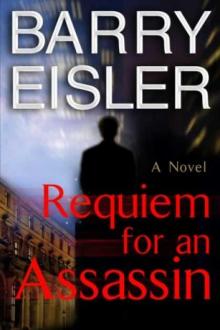 Requiem for an Assassin
Requiem for an Assassin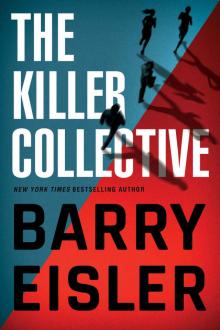 The Killer Collective
The Killer Collective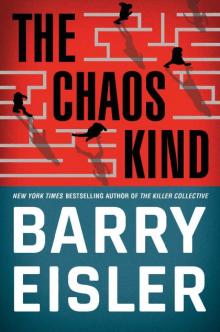 The Chaos Kind
The Chaos Kind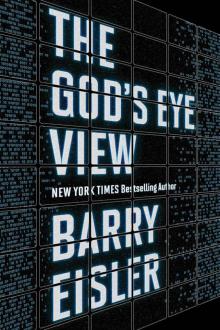 The God's Eye View
The God's Eye View Paris is a Bitch
Paris is a Bitch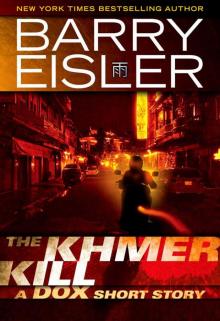 The Khmer Kill: A Dox Short Story (Kindle Single)
The Khmer Kill: A Dox Short Story (Kindle Single)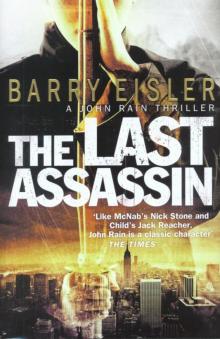 The Last Assassin
The Last Assassin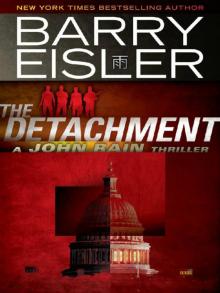 The Detachment
The Detachment The Night Trade (A Livia Lone Novel Book 2)
The Night Trade (A Livia Lone Novel Book 2)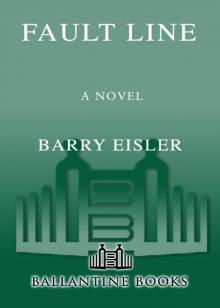 Fault Line
Fault Line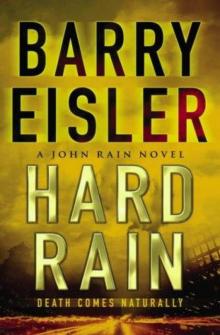 Hard Rain
Hard Rain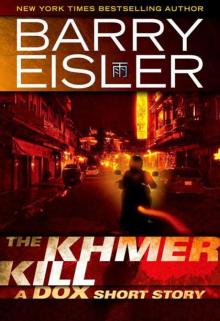 The Khmer Kill_A Dox Short Story
The Khmer Kill_A Dox Short Story London Twist: A Delilah Novella
London Twist: A Delilah Novella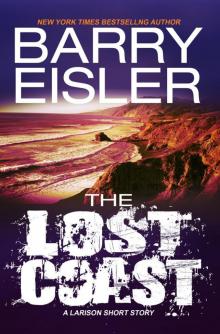 The Lost Coast
The Lost Coast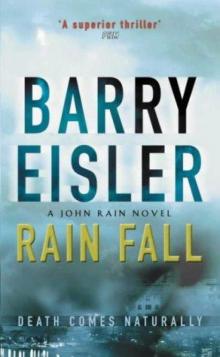 Rain Fall
Rain Fall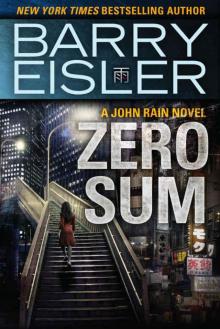 Zero Sum
Zero Sum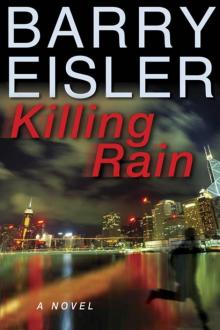 Killing Rain
Killing Rain John Rain 08: Graveyard of Memories
John Rain 08: Graveyard of Memories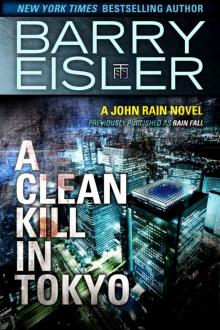 A Clean Kill in Tokyo (previously published as Rain Fall)
A Clean Kill in Tokyo (previously published as Rain Fall) Inside Out: A novel
Inside Out: A novel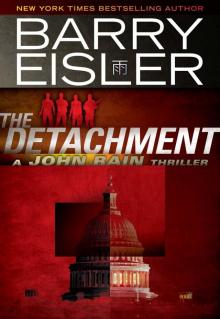 John Rain 07 - The Detachment
John Rain 07 - The Detachment Graveyard of Memories
Graveyard of Memories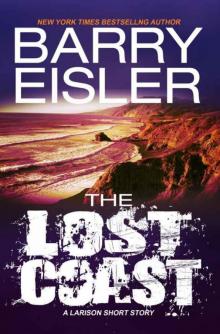 The Lost Coast -- A Larison Short Story
The Lost Coast -- A Larison Short Story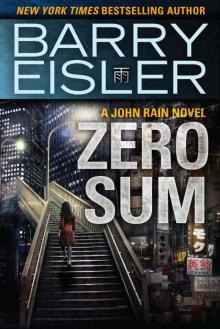 Zero Sum (A John Rain Novel)
Zero Sum (A John Rain Novel)